 Introduction:
Introduction:
So far in this series of posts, we've done a birds-eye view the Bible through the first six books of the Bible. We've noted six themes: creation, catastrophe, patriarchs, redemption and spiritual victory. Today's post will journey through the Book of Judges as we consider our six theme in this continuing blog-series: "breaking the sin-cycle".
The next time you see an ambulance, make sure you take a close look at how the word, "ambulance", is written on the front of it - (the letters are written backwards). Why do ambulances have this weird feature of their very name written in reverse letters? Because whenever you see the name, "ambulance" in the rear view mirror of a car, the word appears with the letters facing the right direction. Mirrors reverse whatever image is reflecting off of them. Whenever we place the Biblical books of Joshua and Judges side-by-side, they're almost mirror opposites. We saw in the last theme of our "birds-eye" study of the Bible that Joshua communicated to us what it means to have spiritual victory. In this next theme, we will look at Judges, which will teach us of the cycle of sin. Thankfully, we will learn from it how we can break the cycle of sin in our lives.
1. Slipping from spiritual victory
into spiritual defeat.
 We read at the end of Joshua 24:31 the following:
We read at the end of Joshua 24:31 the following:
"Israel served the Lord all the days of Joshua and all the days of the elders who survived Joshua, and had known all the deeds of the Lord which He had done for Israel."
The people as a whole were experiencing spiritual victory as they were finally living in the place promised to them by God. To put it another way, God's people were "in the will of God" or "they were doing what they were supposed to do for God".
Roughly 300 years of time passes before our eyes in the Book of Judges. A generation or two comes and goes between Joshua and Judges. Sadly, once Joshua and his generation goes off the scene, the nation of Israel begins to drift away from God. The spiritual condition of the people of God changes from spiritual victory to utter spiritual defeat. Four times (Judges 17:6; 18:1; 19:1; 21:25) we find the following summary of how bad things would get in Israel: "there was no king at that time, and everyone did what was pleasing in his own eyes". As I mentioned earlier, Judges became the spiritual mirror opposite of Joshua.
So what would lead a group of spiritually strong people to become so off track with God? The answer is found in what the Bible describes as the Christian's three main enemies. The first enemy is the Devil. Now we must not think that the Devil can make us do anything - since anytime we sin we do so of our own choice. Yet, the Devil and his kingdom of darkness is behind the temptations that work against us (see Ephesians 6:11-12). Whenever you read the opening chapters of Judges, you find the people compromising with idol worship. False religion is sourced in the evil workings of the Devil and the forces of evil that blind people to the truth of the Lord (2 Corinthians 4:1-4). Even believers have to watch out for the clever deceptions of the Evil One, since He wants to destroy and discourage believers in their faith (see 1 Peter 5:8).
The second enemy of believers is the "world". When I refer to the world, I'm not talking about our planet. Instead, I mean the system that is opposed to Jesus and manipulated by Satan, wrong ideas and man's sinfulness.
1 John 2:15-17 warns us: "Do not love the world nor the things in the world. If anyone loves the world, the love of the Father is not in him. (16) For all that is in the world, the lust of the flesh and the lust of the eyes and the boastful pride of life, is not from the Father, but is from the world. (17) The world is passing away, and also its lusts; but the one who does the will of God lives forever." The Israelites in the time of Judges had to deal with temptations like immorality and "fitting-in" with the crowd. Such surroundings tricked God's people into a more "worldly" direction.
The third enemy of the believer is what the Bible calls: "the flesh". The term "flesh" speaks of any internal desire that opposes God. We can see examples of various Judges getting in trouble with preferring their internal desires to that of God's wisdom. An example of this is Samson. He kept on relying on his own opinions and what others told him.
So the three enemies of the world, the flesh and the Devil were working against the Jewish people, just as all three oppose every Christian today. Whenever we choose to follow anyone of those three enemies, we will find ourselves getting stuck in a cycle of sin. James 1:13-15 reminds us:
"Let no one say when he is tempted, “I am being tempted by God”; for God cannot be tempted by evil, and He Himself does not tempt anyone. (14) But each one is tempted when he is carried away and enticed by his own lust. (15) Then when lust has conceived, it gives birth to sin; and when sin is accomplished, it brings forth death."
2. Getting stuck in the rut of sin
 Have you ever seen a car get stuck in the mud or snow? One reason a car can remain stuck is due to ruts. Whenever we find ourselves in a repeated cycle of sin, we call that a "rut". What cycle or "rut" do we find in Judges? Judges chapter two lays out a six-step cycle of sin that is repeated by the Israelites in Judges:
Have you ever seen a car get stuck in the mud or snow? One reason a car can remain stuck is due to ruts. Whenever we find ourselves in a repeated cycle of sin, we call that a "rut". What cycle or "rut" do we find in Judges? Judges chapter two lays out a six-step cycle of sin that is repeated by the Israelites in Judges:
-They sin (Judges 2:11-13).
-They're overwhelmed by enemies (2:14-15).
-They beg God for help (2:16-18).
-Israel would repent, then slip back (2:19).
-The people would sin worse (2:20).
- Cycle repeats.
3. How can you and I get out of the cycle of sin or "the rut".
 In all the times we find Israel in their cycles of sin, the only time we find the cycle coming to a temporary stop is whenever they did two things: "confess their mess" and "repent and return to God". The first step, "confession", means to tell God what we did, and that what we did we recognize as wrong. God already knows about our sin. We need to recognize that our sin is sin. In confession, I'm admitting that I'm wrong, and that I need Jesus to forgive me (1 John 1:9). When we confess our sin to Jesus, our closeness or fellowship with God is renewed. There is a second step: repentance. Repentance means: "to change one's mind about sin and and get back to God". Repentance doesn't merely mean: "I'm sorry". It's more than that. Repentance wants to get right with God and thus, hates the sin that interrupted closeness with God (see 2 Corinthians 7:5).
In thinking back to God's covenant of grace (remember God's covenant with Adam and Eve, as well as the repetition of it to Noah and Abraham), that covenant was shown most fully in Jesus' cross and resurrection. The Holy Spirit, at saving faith, unites the believer to Jesus and the achievement of His work on the cross and from the empty tomb. This union with Christ is the resource by which Christians are able to break free from repeated sin-cycles (Galatians 2:20; 1 John 1:9). The Christian keeps on confessing their need for Him and turning away from sin to Him. When Christians confess and repent, they're not getting "resaved". Rather, the Christian is growing spiritually and breaking the cycle of a particular sin, thus making a deeper commitment to love Jesus and hate sin. We can learn what not to do, and how to regain spiritual victory by reading through the book of Judges.
In all the times we find Israel in their cycles of sin, the only time we find the cycle coming to a temporary stop is whenever they did two things: "confess their mess" and "repent and return to God". The first step, "confession", means to tell God what we did, and that what we did we recognize as wrong. God already knows about our sin. We need to recognize that our sin is sin. In confession, I'm admitting that I'm wrong, and that I need Jesus to forgive me (1 John 1:9). When we confess our sin to Jesus, our closeness or fellowship with God is renewed. There is a second step: repentance. Repentance means: "to change one's mind about sin and and get back to God". Repentance doesn't merely mean: "I'm sorry". It's more than that. Repentance wants to get right with God and thus, hates the sin that interrupted closeness with God (see 2 Corinthians 7:5).
In thinking back to God's covenant of grace (remember God's covenant with Adam and Eve, as well as the repetition of it to Noah and Abraham), that covenant was shown most fully in Jesus' cross and resurrection. The Holy Spirit, at saving faith, unites the believer to Jesus and the achievement of His work on the cross and from the empty tomb. This union with Christ is the resource by which Christians are able to break free from repeated sin-cycles (Galatians 2:20; 1 John 1:9). The Christian keeps on confessing their need for Him and turning away from sin to Him. When Christians confess and repent, they're not getting "resaved". Rather, the Christian is growing spiritually and breaking the cycle of a particular sin, thus making a deeper commitment to love Jesus and hate sin. We can learn what not to do, and how to regain spiritual victory by reading through the book of Judges.
Return back for our next theme.
 Introduction:
Introduction:
Have you ever watched any sport where one team scored nearly all the points? If you have, it is likely you heard such descriptions of that game as: "it was a shut out" or "that team dominated the other". In other words, the winning team was able to obtain not just a victory, but an "upset victory".
In our bird's eye view of the Bible thus far, we've considered five themes: creation, fall, catastrophe, patriarchs and redemption. We saw how God chose to relate to all He made by way of "covenants" or "binding promises" in two main covenants:

1. A covenant of works (which Adam
and Eve broke, leading to the
catastrophe of the fall).

2. And a covenant of grace (which God
made with them, based on grace,
through faith and shedding of
innocent blood).
We also noted that God regulates the moral state of mankind (that is, mankind's continued rebellion against Him) by conscience, government, promise and God's law. The next theme we will consider in this section is that of "victory". The Book of Joshua illustrates the Christian life and the call to spiritual victory.
1. God the Holy Spirit calls believers to spiritual victory.
 Now imagine a last-place basketball team that plays a championship game against a first place team - who would you expect to win? Once the game is over, we may expect the first place team. However, if the last place team got a victory over the first place team to win the championship, we would wonder how did such a win come about? A few may begin to wonder if the conquering team had help from above?
Now imagine a last-place basketball team that plays a championship game against a first place team - who would you expect to win? Once the game is over, we may expect the first place team. However, if the last place team got a victory over the first place team to win the championship, we would wonder how did such a win come about? A few may begin to wonder if the conquering team had help from above?
In the Biblical book of Joshua, we find the Hebrew people called by God to victory in the promised land. The promised land was rightfully their home by the promise or covenant He had given to Abraham, Isaac and Jacob. God had given them the promises, but now they needed to take possession of the them.
Christians are spiritually compared to Israel in the book of Joshua (Hebrews 3-4). We have a better set of promises than they did because Jesus died and raised from the dead in our place (Hebrews 8). What is also better for Christians is that God lives inside each one by the Person of the Holy Spirit (1 Corinthians 3:16; 6:19-20).
2. Believers must choose to rely on
Jesus to lead them.
 A Christian is called by God to spiritual victory, however, they need to choose to trust Him to lead them. The Exodus out of Egypt and crossing of the Red Sea pictures salvation, since Christians are people freed from sin's enslavement to enjoy freedom through faith in Jesus Christ (Romans 6:12-14; 8:7-9). We can illustrate salvation by the Exodus. When God brought the people out of Egypt, He was "getting the people out of Egypt". Yet, the remainder of the Christian life is about the Holy Spirit working with the Christian to get their love for the world, or former life (illustrated by "Egypt") out of them.
A Christian is called by God to spiritual victory, however, they need to choose to trust Him to lead them. The Exodus out of Egypt and crossing of the Red Sea pictures salvation, since Christians are people freed from sin's enslavement to enjoy freedom through faith in Jesus Christ (Romans 6:12-14; 8:7-9). We can illustrate salvation by the Exodus. When God brought the people out of Egypt, He was "getting the people out of Egypt". Yet, the remainder of the Christian life is about the Holy Spirit working with the Christian to get their love for the world, or former life (illustrated by "Egypt") out of them.
The Hebrew people became publicly identified as a rescued people when God gave them the ten commandments at Mt.Sinai through Moses. Like Adam and Eve, they broke God's covenant to them, resulting in their wandering in a desert for forty years. However, God did not give up on them. He kept His promise of grace which He had given to their ancestors Abraham, Isaac and Jacob. This ever reminds us that whenever a Christian messes up, God is ever forgiving and faithful to keep His promise never to leave nor forsake us (2 Timothy 2:13; Hebrews 13;5).
 What the people needed to learn was how to trust God to lead them - a concept called, "Lordship". For the Christian, Jesus becomes their Lord at salvation, but learning to enjoy His authority over them is a life-long experience. In order to cross over into the promised land, there needed to be a Jordan River that was flooded and flowing. Trusting God's Lordship meant they had to rest in His ability or "Lordship" to help them cross what was otherwise a "river of death".
What the people needed to learn was how to trust God to lead them - a concept called, "Lordship". For the Christian, Jesus becomes their Lord at salvation, but learning to enjoy His authority over them is a life-long experience. In order to cross over into the promised land, there needed to be a Jordan River that was flooded and flowing. Trusting God's Lordship meant they had to rest in His ability or "Lordship" to help them cross what was otherwise a "river of death".
Christians too are called to have a willingness to follow Christ as the One who leads (Hebrews 4:1-4). The Jordan River teaches us the lesson of reliance upon God.
3. Spiritual victory requires the
believer to cooperate with God.
 We've seen then that believers must rely upon Jesus as the heed the call to spiritual victory. To remain victorious in the Christian life, the follower of Jesus must exercise cooperation with God.
We've seen then that believers must rely upon Jesus as the heed the call to spiritual victory. To remain victorious in the Christian life, the follower of Jesus must exercise cooperation with God.
As Christians begin their relationship with Jesus Christ, they must fight the good fight of faith (Ephesians 6:11-18; 2 Timothy 4:6-8). Israel had to fight their opponents at various cities (Joshua 4-10). They then had to secure whatever progress they made by continually trusting God to lead them. Once Israel crossed the Jordan River to begin their taking back of the Promised-land, it was not going to be easy. There was a necessary cooperation with God if the people were going to remain in victory.
The people who lived in that land inhabited it for centuries. For anyone who trusts in Jesus today, following Him isn't easy. Whatever sort of life anyone lives prior to saving faith is still remembered, with old habits and thinking not completely forgotten. The Holy Spirit's job back in Joshua's time and today is to strengthen believers to deal with those things which stand in the way of following Jesus more closely.
Furthermore, just as the Canaanites in Joshua weren't going to give up without a fight, so too, our internal desires to still sin will daily clash with the believer's new inward desires to follow Jesus (see Romans 7:14-23). Furthermore, unless God helped them every step of the way, and unless they cooperated, they would never possess the land that was their land by promise.
The Christian life is about fighting against the desires of our heart to disobey God (called, "the flesh", Romans 8:7-8). Moreover, the Christian has to also resist the temptations of the world (1 Corinthians 10:13; 1 John 2:15-17) and the Devil (1 Peter 5:8). Getting victory won't happen if we don't cooperate with God by daily reading our Bible (Joshua 1:8), praying (Philippians 4:6-7) and weekly church attendance (Hebrews 10:24-25). In other words, we must work with God as He works in us to grow as those who have trusted in Jesus by faith.
4. Spiritual victory involves
continuing in the way obedience
to the Lord.
 As we come to the end of our flight through this theme of victory, we noted that the Christian is called, must choose to trust God and cooperate with Him to live in spiritual victory. The Book of Joshua emphasizes one more truth: the need to continue in obedience to the Lord.
As we come to the end of our flight through this theme of victory, we noted that the Christian is called, must choose to trust God and cooperate with Him to live in spiritual victory. The Book of Joshua emphasizes one more truth: the need to continue in obedience to the Lord.
We find Joshua giving his final farewell to the people. He warns them that the challenges they faced in the promised land won't go away. Furthermore, times will come when they have to choose between what is popular and what is right. Whenever the Christian gains victory, it is much tougher to remain victorious. Romans 12:1-2 reminds us that we are to present our bodies as living sacrifices, acceptable unto God, which is our spiritual act of worship. We must also make sure we're not trying to "fit in with everyone else" (what Romans 12:2 calls, "not being conformed to this world"). Rather, we must be changed in the renewal of our minds.
Following the Lord everyday doesn't just "happen". Following Him must happen on purpose. Israel is challenged to "choose this day whom you will serve". The Christian who decides to keep on walking in spiritual victory can say, just like Joshua: "as for me and my house, we will serve the Lord".
 Introduction:
Introduction:
Have you ever heard of the saying: “time flies when you're having fun?" In our "Bird's eye view" of the Bible, we have traveled through over 3,000 years of time through the first book of the Bible. For readers interested in reviewing the series from the beginning, they can click on the following links listed below.
1. Introducing a bird's-eye view of the Bible. http://www.growingchristianresources.com/2020/01/introducing-birds-eye-view-of-bible.html
2. Bird's-eye view of the Bible - theme of creation. http://www.growingchristianresources.com/2020/01/birds-eye-view-of-bible-theme-of.html
3. Bird's-eye view of the Bible - theme of the patriarchs - salvation revealed through Abraham, Isaac and Jacob.
http://www.growingchristianresources.com/2020/02/birds-eye-view-of-bible-theme-of_9.html
 The Book of Genesis covers more time than all the other books of the Bible put together. If we were to do a "count down" of the major truths explored in the last several posts so far, we could note them as follows:
The Book of Genesis covers more time than all the other books of the Bible put together. If we were to do a "count down" of the major truths explored in the last several posts so far, we could note them as follows:
FOUR. Four major men: Adam, Noah, Abraham and Jacob.
THREE. Three themes: creation, catastrophe and patriarchs.
TWO, Two major covenants: covenant of works (broken by Adam) & grace (spoken to Eve, expressed in different forms to Noah and Abraham).
ONE, One Creator and Redeemer: God
Our next theme will cover four books of the Bible (Exodus, Leviticus, Numbers and Deuteronomy) and span 120 years of time. This next theme, "redemption", will feature God's calling of one man to lead what would become the nation of Israel, namely, the man we know as "Moses".
1. What redemption means and how God is the Redeemer of His people.
 Whenever we talk about "redemption", we refer to purchasing back what rightfully belongs to the purchaser. Perhaps you've heard of what are called, "coupons". Whenever I give a coupon to a clerk at a grocery store, I am getting the given item at a reduced price. Whenever I hand in that coupon, it is called, "redeeming the coupon", since the store will send the coupon away to the manufacturer to get a preset amount of money. The store is able to save me money because of an agreement made way before I went to the store. When we think of God’s plan of salvation, the agreed upon purchase price (the Son sent to earth to live as a man, die, rise from the dead) was made between God the Father, Son and Holy Spirit in eternity (Ephesians 1:11; 2 Timothy 1:9; Titus 1:2). In order to receiving the salvation already accomplished, I must receive all Jesus has done and is by faith (Ephesians 2:8-9).
Whenever we talk about "redemption", we refer to purchasing back what rightfully belongs to the purchaser. Perhaps you've heard of what are called, "coupons". Whenever I give a coupon to a clerk at a grocery store, I am getting the given item at a reduced price. Whenever I hand in that coupon, it is called, "redeeming the coupon", since the store will send the coupon away to the manufacturer to get a preset amount of money. The store is able to save me money because of an agreement made way before I went to the store. When we think of God’s plan of salvation, the agreed upon purchase price (the Son sent to earth to live as a man, die, rise from the dead) was made between God the Father, Son and Holy Spirit in eternity (Ephesians 1:11; 2 Timothy 1:9; Titus 1:2). In order to receiving the salvation already accomplished, I must receive all Jesus has done and is by faith (Ephesians 2:8-9).
 The redemption revealed by God was planned in eternity and made known in history – as we see revealed in the Bible. Genesis 12-50 records the history of Abraham and the Jewish people. The Jewish people descended from Abraham, Isaac and Jacob become a large group of people in Egypt. Jacob had to take his family to Egypt due to a famine. Jacob's sons had sold their brother, Joseph, into slavery in Egypt years prior to the famine. God orchestrated that Joseph would rise to second-in-command in Egypt so as to take care of all the people and his family once they arrived in Egypt (Genesis 37-50). God was involved in all these events, as plainly stated by Joseph in Genesis 50:20 - "what you meant for evil, God meant for good".
The redemption revealed by God was planned in eternity and made known in history – as we see revealed in the Bible. Genesis 12-50 records the history of Abraham and the Jewish people. The Jewish people descended from Abraham, Isaac and Jacob become a large group of people in Egypt. Jacob had to take his family to Egypt due to a famine. Jacob's sons had sold their brother, Joseph, into slavery in Egypt years prior to the famine. God orchestrated that Joseph would rise to second-in-command in Egypt so as to take care of all the people and his family once they arrived in Egypt (Genesis 37-50). God was involved in all these events, as plainly stated by Joseph in Genesis 50:20 - "what you meant for evil, God meant for good".
 Whenever we arrive in the book of Exodus, 430 years has passed between the days of Abraham and the time of Moses (see Galatians 3:17). The Jews, as we mentioned earlier, are enslaved by the Egyptians. The big pyramids you have seen in pictures of Egypt were likely built in part by the Hebrew people. They all were praying very hard to God for their freedom, with Exodus 1 stating: "and God heard their cry". God prepared a man whom He would use to redeem the people out of Egypt into the freedom that comes in knowing God - that man's name was, "Moses".
2. Moses, called by God to redeem a people in slavery
Whenever we arrive in the book of Exodus, 430 years has passed between the days of Abraham and the time of Moses (see Galatians 3:17). The Jews, as we mentioned earlier, are enslaved by the Egyptians. The big pyramids you have seen in pictures of Egypt were likely built in part by the Hebrew people. They all were praying very hard to God for their freedom, with Exodus 1 stating: "and God heard their cry". God prepared a man whom He would use to redeem the people out of Egypt into the freedom that comes in knowing God - that man's name was, "Moses".
2. Moses, called by God to redeem a people in slavery
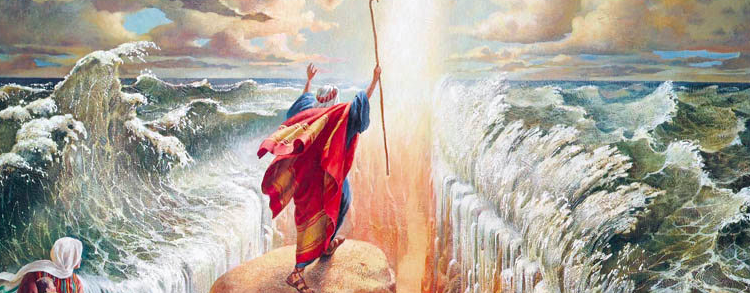 Moses' very name would come to describe the way God was going to use him (literally, “one who is drawn out"). As we observe in Exodus 1-2, when Moses was a baby, Pharaoh had made a law that all first-born Hebrew (that is, Jewish) males were to be killed. Moses' mother had his sister hide him in a basket which was specially prepared to float down the biggest river in Egypt - The Nile. As God planned it, Pharaoh's daughter found little Moses and instantly adopted him as her own son.
Moses' very name would come to describe the way God was going to use him (literally, “one who is drawn out"). As we observe in Exodus 1-2, when Moses was a baby, Pharaoh had made a law that all first-born Hebrew (that is, Jewish) males were to be killed. Moses' mother had his sister hide him in a basket which was specially prepared to float down the biggest river in Egypt - The Nile. As God planned it, Pharaoh's daughter found little Moses and instantly adopted him as her own son.
 As a princess, Pharaoh's daughter hired a woman to help her take care of little Moses. Again, God's work was involved - for the very woman hired by Pharaoh's daughter was none other than Moses' own mom! Pharaoh's daughter named him "Moses" because, she said: "I drew him out of the water".
As a princess, Pharaoh's daughter hired a woman to help her take care of little Moses. Again, God's work was involved - for the very woman hired by Pharaoh's daughter was none other than Moses' own mom! Pharaoh's daughter named him "Moses" because, she said: "I drew him out of the water".
We can conveniently divide his life (totaling 120 years) in three 40-year periods. Each 40-year period of Moses' life represents a major stage in his experience of God as God redeemed Moses and the Jewish people. As we look at Moses' life, you will find some applications for your own.
3. God's redemption involves preparing His people for carrying out His calling on their lives.
 In the first 40 years of Moses' life, we find God preparing Moses. God used Moses' mother to speak the words of God into him. Moses knew he wasn't an Egyptian. Instead, he understood himself as a Hebrew - a descendant of Abraham, Isaac and Jacob. God also used the education and royal court life to teach Moses valuable leadership skills that he would need later when leading Israel in the desert. God also used Moses' passion to alert him to the needs of his fellow Hebrews.
In the first 40 years of Moses' life, we find God preparing Moses. God used Moses' mother to speak the words of God into him. Moses knew he wasn't an Egyptian. Instead, he understood himself as a Hebrew - a descendant of Abraham, Isaac and Jacob. God also used the education and royal court life to teach Moses valuable leadership skills that he would need later when leading Israel in the desert. God also used Moses' passion to alert him to the needs of his fellow Hebrews.
Are you in the stage of life where God is preparing you? God's work of redemption not only involves "saving you from" sin and judgement, but also "saving you unto" a new life with God. As God was redeeming the Jewish people to follow Him as a people, He also redeemed Moses from the shame of the past to prepare him to do what God called him to do.
4. God's redemption includes maturing His people to grow in their relationship with Him.
 Moses lived in Egypt for the first 40 years of his life. He was prepared by God in the gaining of skills he would need much later in life. However, Moses needed to mature. He one day observed an Egyptian officer beating a Hebrew slave (Exodus 2:11-14). Moses' anger arose within his heart. He murdered the Egyptian, hiding him in the desert sand. Soon, everyone, including Pharaoh, knew about Moses' act. Consequently, Moses fled from Egypt into a dry desert called "Midian". Moses would get married and shepherd sheep for his father-in-law Jethro for 40 years.
This second 40-year period of time was God's way of taking Moses from preparation to maturation. Moses needed to learn how to serve before he could lead. He needed to develop skills for shepherding sheep before he could ever shepherd people. He had to harness that temper of his rather than let it get the better of him (which he still struggled with once he led Israel). He had to understand life in the wilderness, since he would lead an entire nation through a wilderness for the final 40 years of his life. Most important to Moses' second 40-year period of maturing was finding contentment in being alone to gain sensitivity to the things of God.
If you are a Christian, you should be in the process of maturing and growing in your faith. When Jesus purchased your salvation on the cross, the work God would do in maturing every believer was included in that redemption (see 1 Corinthians 1:30). In Egypt, Moses relied on what he could possibly do. In that wilderness, shepherding his father-in-law's sheep, Moses was matured to understand that, by himself, he could do nothing unless God were with Him. Many of the same sort of lessons are given to Christians, such as "I can do all things through Christ who gives me strength" (Philippians 4:13). God will use tough times, relationships, His Word, prayer, church and circumstances to grow us in our faith (see 2 Corinthians 4:16-18; Ephesians 4:11-12; 1 Peter 1:6-7).
5. God's redemption aims to launch His people to fulfill His calling on their life.
Moses lived in Egypt for the first 40 years of his life. He was prepared by God in the gaining of skills he would need much later in life. However, Moses needed to mature. He one day observed an Egyptian officer beating a Hebrew slave (Exodus 2:11-14). Moses' anger arose within his heart. He murdered the Egyptian, hiding him in the desert sand. Soon, everyone, including Pharaoh, knew about Moses' act. Consequently, Moses fled from Egypt into a dry desert called "Midian". Moses would get married and shepherd sheep for his father-in-law Jethro for 40 years.
This second 40-year period of time was God's way of taking Moses from preparation to maturation. Moses needed to learn how to serve before he could lead. He needed to develop skills for shepherding sheep before he could ever shepherd people. He had to harness that temper of his rather than let it get the better of him (which he still struggled with once he led Israel). He had to understand life in the wilderness, since he would lead an entire nation through a wilderness for the final 40 years of his life. Most important to Moses' second 40-year period of maturing was finding contentment in being alone to gain sensitivity to the things of God.
If you are a Christian, you should be in the process of maturing and growing in your faith. When Jesus purchased your salvation on the cross, the work God would do in maturing every believer was included in that redemption (see 1 Corinthians 1:30). In Egypt, Moses relied on what he could possibly do. In that wilderness, shepherding his father-in-law's sheep, Moses was matured to understand that, by himself, he could do nothing unless God were with Him. Many of the same sort of lessons are given to Christians, such as "I can do all things through Christ who gives me strength" (Philippians 4:13). God will use tough times, relationships, His Word, prayer, church and circumstances to grow us in our faith (see 2 Corinthians 4:16-18; Ephesians 4:11-12; 1 Peter 1:6-7).
5. God's redemption aims to launch His people to fulfill His calling on their life.
 The third 40-year period of Moses' life was where God launched Moses to fulfill God's calling on his life. Whenever we speak of God's calling, we refer to that urgent impulse in our hearts that makes clear our purpose on the planet. Let me ask you: "have you ever thought about what your purpose on this planet?" Stated another way: "why does God have you here?" God has some of you reading this post in a stage of preparation right now. As you grow, He will mature you to be the man or woman of God He is calling you to be. There will come that moment, like Moses, when God's preparation and maturity of you becomes a launching of you to fulfill His calling on your life.
The third 40-year period of Moses' life was where God launched Moses to fulfill God's calling on his life. Whenever we speak of God's calling, we refer to that urgent impulse in our hearts that makes clear our purpose on the planet. Let me ask you: "have you ever thought about what your purpose on this planet?" Stated another way: "why does God have you here?" God has some of you reading this post in a stage of preparation right now. As you grow, He will mature you to be the man or woman of God He is calling you to be. There will come that moment, like Moses, when God's preparation and maturity of you becomes a launching of you to fulfill His calling on your life.
 Moses' day of launching had come in the form of God speaking to him by a burning bush. It was a day like any other - except for one obvious detail - a desert bush was on fire but was not getting burned up! Finally! Moses had an exciting event in his otherwise same, daily routine of leading sheep from one grassy spot to another. Moses walked over to check out why the bush was not incinerated by the blazing fire when, suddenly, a booming voice echoed from the bush! God Himself spoke to Moses, revealing to Moses that He alone was God and that He had heard the cries of His people (Exodus 3:7-14).
God launched Moses by telling him His personal Divine name (“I am who I am” or “Yahweh”). Furthermore, He had a job for Moses to do: "go tell Pharaoh to let my people go". Moses made excuses for why he was not the right man for the job, however, God convinced a reluctant prophet (Exodus 4:10-17). So, Moses went back to Egypt, reunited with his family and his people. God worked ten plagues through Moses and his brother Aaron, yet, Pharaoh would resist their requests to release the people from slavery. It was the final plague that had Pharaoh seemingly surrender, letting Moses and the people flee from Egypt
Moses' day of launching had come in the form of God speaking to him by a burning bush. It was a day like any other - except for one obvious detail - a desert bush was on fire but was not getting burned up! Finally! Moses had an exciting event in his otherwise same, daily routine of leading sheep from one grassy spot to another. Moses walked over to check out why the bush was not incinerated by the blazing fire when, suddenly, a booming voice echoed from the bush! God Himself spoke to Moses, revealing to Moses that He alone was God and that He had heard the cries of His people (Exodus 3:7-14).
God launched Moses by telling him His personal Divine name (“I am who I am” or “Yahweh”). Furthermore, He had a job for Moses to do: "go tell Pharaoh to let my people go". Moses made excuses for why he was not the right man for the job, however, God convinced a reluctant prophet (Exodus 4:10-17). So, Moses went back to Egypt, reunited with his family and his people. God worked ten plagues through Moses and his brother Aaron, yet, Pharaoh would resist their requests to release the people from slavery. It was the final plague that had Pharaoh seemingly surrender, letting Moses and the people flee from Egypt
 However, Pharaoh changed his mind and commanded his armies to pursue the nearly 2 million Hebrew people and Moses, who were nearing the Red Sea (Exodus 14). God did a miracle and parted the Red Sea so that Moses and the people could cross on dry ground to the other shoreline. As soon as it became daybreak, Pharaoh and his armies were beginning to cross when Yahweh (remember, that is God’s personal name) caused the Red Sea to drown the Egyptian army. The Exodus was complete. The Hebrew people were no longer slaves of Pharaoh. Now they were the treasured possession of God Himself (Exodus 20:1-2). However, the journey through the desert was going to begin.
However, Pharaoh changed his mind and commanded his armies to pursue the nearly 2 million Hebrew people and Moses, who were nearing the Red Sea (Exodus 14). God did a miracle and parted the Red Sea so that Moses and the people could cross on dry ground to the other shoreline. As soon as it became daybreak, Pharaoh and his armies were beginning to cross when Yahweh (remember, that is God’s personal name) caused the Red Sea to drown the Egyptian army. The Exodus was complete. The Hebrew people were no longer slaves of Pharaoh. Now they were the treasured possession of God Himself (Exodus 20:1-2). However, the journey through the desert was going to begin.
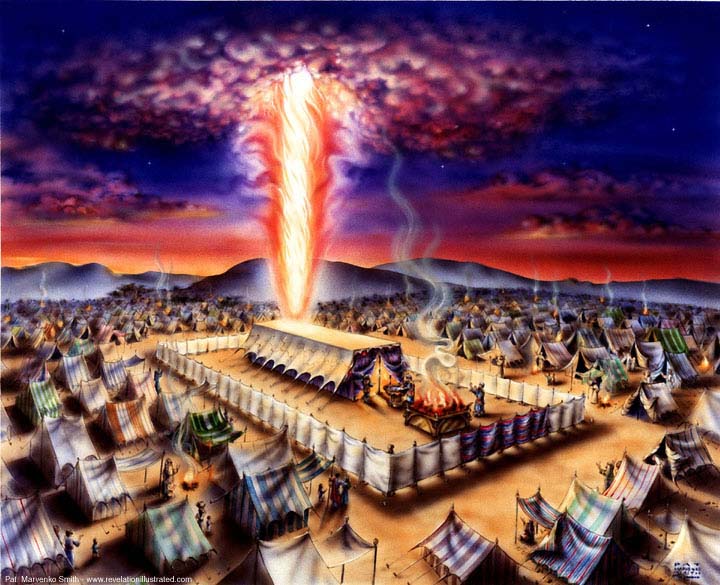 God revealed to them their identity, the ten commandments and the place they would worship Him - called "the tabernacle". God would provide food by raining bread from the sky (called "manna"). Sadly, the people complained and sinned greatly against God and Moses. The remaining forty years from the giving of God's law at Mount Sinai until they reached the Eastern banks of the Jordan River involved wandering through a wilderness. The trip should had taken about two weeks, yet, the sin of the people cost 40 years. Furthermore, at one point, Moses' temper got the best of him and God prevented him from entering the promised land.
God revealed to them their identity, the ten commandments and the place they would worship Him - called "the tabernacle". God would provide food by raining bread from the sky (called "manna"). Sadly, the people complained and sinned greatly against God and Moses. The remaining forty years from the giving of God's law at Mount Sinai until they reached the Eastern banks of the Jordan River involved wandering through a wilderness. The trip should had taken about two weeks, yet, the sin of the people cost 40 years. Furthermore, at one point, Moses' temper got the best of him and God prevented him from entering the promised land.
:max_bytes(150000):strip_icc()/Moses-and-the-Ten-Commandments-GettyImages-171418029-5858376a3df78ce2c3b8f56d.jpg) Just as Adam and Eve had broken the first Covenant given by God, with consequences of sin, death and separation from God, so we find Israel breaking God’s covenant with them. The account of Israel wandering through the wilderness was due to their heeding the advice of spies sent by Moses to survey the promised land which God had told them to eventually travel. Whenever the twelve spies returned, ten of the twelve said it was an impossible journey. The people listened to the advice of the ten spies. Consequently, that particular generation was forbidden by God to enter the promised land (see Numbers 13).
Just as Adam and Eve had broken the first Covenant given by God, with consequences of sin, death and separation from God, so we find Israel breaking God’s covenant with them. The account of Israel wandering through the wilderness was due to their heeding the advice of spies sent by Moses to survey the promised land which God had told them to eventually travel. Whenever the twelve spies returned, ten of the twelve said it was an impossible journey. The people listened to the advice of the ten spies. Consequently, that particular generation was forbidden by God to enter the promised land (see Numbers 13).
The failure of the ancient Israelites echoes what we saw back in Genesis 3. Thankfully, God's basis for the salvation of His people was not rooted in the Law, but rather in His loving grace He revealed when He rescued them from Egypt. Furthermore, God made a covenant with Abraham to bring about a nation, which He had no intention of breaking. Moses would conclude the final months of his life preaching to the people to continue following God by faith as they heeded the commands God gave them. Moses, the man of God, died at 120. A remarkable stage in Israel's history was done.
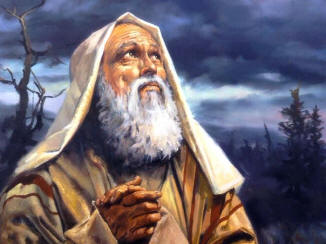 Introduction:
Introduction:
We continue on with our theme-by-theme survey of the Bible that we are calling: "a bird's-eye view of the Bible". So far, we've journeyed through the themes of creation and catastrophe. Readers can review the last post on the theme of creation here: http://www.growingchristianresources.com/2020/01/birds-eye-view-of-bible-theme-of.html and the theme of catastrophe here: http://www.growingchristianresources.com/2020/02/birds-eye-view-of-bible-theme-of.html
Both of these major themes comprise the first eleven chapters of the Book of Genesis. Genesis 1-11 covers the greatest span of time in the Bible (at least 1656 years). Whenever we study Genesis 1-11, we introduced to virtually every major truth we encounter in scripture. Some of those fundamental truths we find in Genesis 1-11 are: creation (1-2); sin (3); death (4); walking with God (5); grace (6); judgment (6-7); mercy and promise (8); covenant (9); nations of the earth (10); God's providence (11). There are many more truths we could mention, however we must move onto the third theme in our study which will cover the remainder of the Book of Genesis: the theme of "patriarchs".
Our journey from creation through catastrophe to the patriarchs
 As we prepare to continue our flyover of the Bible, we keep in mind that, so far, we've experienced creation and the age of innocence. Remember, whenever God created and made everything, there was no sin or death. He had made an original covenant (remember what that was? A binding promise) with Adam and Eve for the sake of their relationship with Him. Their testing came whenever the serpent, Satan, tempted them in the Garden of Eden, resulting in their failure or Fall. Sadly, catastrophe had struck. Consequently, the fall of Adam and Eve spelled out a Divine curse of sin and death on all people (see Romans 5:11-21).
As we prepare to continue our flyover of the Bible, we keep in mind that, so far, we've experienced creation and the age of innocence. Remember, whenever God created and made everything, there was no sin or death. He had made an original covenant (remember what that was? A binding promise) with Adam and Eve for the sake of their relationship with Him. Their testing came whenever the serpent, Satan, tempted them in the Garden of Eden, resulting in their failure or Fall. Sadly, catastrophe had struck. Consequently, the fall of Adam and Eve spelled out a Divine curse of sin and death on all people (see Romans 5:11-21).
 Thankfully, God issued a second covenant, the covenant of grace, which they received by faith and included the death of innocent sacrifices on their behalf - all done because of God's grace (Genesis 3:15,20-21; Hosea 6:7). The short time-frame of innocence gave way to what is called by some: "the age of conscience". God would continue to preserve the moral and physical life of sinful human beings through their consciences. The conscience is that sudden joy you feel when you've done something right or that sudden unhappiness you feel when you've committed a sin.
Thankfully, God issued a second covenant, the covenant of grace, which they received by faith and included the death of innocent sacrifices on their behalf - all done because of God's grace (Genesis 3:15,20-21; Hosea 6:7). The short time-frame of innocence gave way to what is called by some: "the age of conscience". God would continue to preserve the moral and physical life of sinful human beings through their consciences. The conscience is that sudden joy you feel when you've done something right or that sudden unhappiness you feel when you've committed a sin.
 God the Holy Spirit extends common, non-saving grace to all people by preserving mankind from being as bad as he possibly could-be by way of the moral law written on the conscience (Romans 2:14-15). The work of the Spirit in regulating the boundaries of mankind's rebellion by way of the conscience is first seen between the Fall of Genesis 3 until we arrive at Noah in Genesis 6. What of course is needed is that specific, saving work of the Holy Spirit that draws individual sinners in saving faith to the promises of God's salvation (Old Testament) and saving faith in the Personal Savior of salvation, Jesus Christ (John 16:8-12; Acts 4:12).
God the Holy Spirit extends common, non-saving grace to all people by preserving mankind from being as bad as he possibly could-be by way of the moral law written on the conscience (Romans 2:14-15). The work of the Spirit in regulating the boundaries of mankind's rebellion by way of the conscience is first seen between the Fall of Genesis 3 until we arrive at Noah in Genesis 6. What of course is needed is that specific, saving work of the Holy Spirit that draws individual sinners in saving faith to the promises of God's salvation (Old Testament) and saving faith in the Personal Savior of salvation, Jesus Christ (John 16:8-12; Acts 4:12).
As we journeyed through Genesis 4-11, we observe the spreading of the catastrophe of the Fall. Cain murdered Abel, signaling that the disease of sin was far worst than ever imagined. Adam and Eve would have another son, Seth, from whom would begin a series of nine other generations of humanity we find listed in Genesis 5-9. Two other catastrophes were mentioned in our journey: the world-wide flood of Noah in Genesis 6-9 and the Tower of Babel in Genesis 10-11.
 God would to set forth the third age of history and another means of exercising His providential care over mankind, called by some: "the age of government". Romans 13:1 tells us that God was the One who instituted government. God also reissued a version of the covenant of Grace with Noah after the flood, pledging to never again destroy the world with a flood. Noah and his wife would have three sons: Shem, Ham and Japheth, whom each would function as the three sources of humanity's seventy original nations. One new theme emerges, beginning with Seth through the ten generations up to Noah and another ten generations to a very important man, Abraham, namely: “the theme of patriarchs”.
God would to set forth the third age of history and another means of exercising His providential care over mankind, called by some: "the age of government". Romans 13:1 tells us that God was the One who instituted government. God also reissued a version of the covenant of Grace with Noah after the flood, pledging to never again destroy the world with a flood. Noah and his wife would have three sons: Shem, Ham and Japheth, whom each would function as the three sources of humanity's seventy original nations. One new theme emerges, beginning with Seth through the ten generations up to Noah and another ten generations to a very important man, Abraham, namely: “the theme of patriarchs”.
What is a patriarch?
A patriarch, in the Biblical sense, refers to a God-appointed founder of the nation of Israel or first-example of what it means to walk by faith. We will meet and learn about the patriarchs Noah, Abraham, Isaac and Jacob. Exploring the patriarchs is important to growing in our understanding of the Bible. God’s covenant with Noah was a promise to never again destroy the world with a flood. His covenant with Abraham would bring about the nation of Israel and ultimately prepare for the coming of Jesus. Many lessons about faith and life are learned by watching how the patriarchs responded to God.
Who are patriarchs and why they’re important?
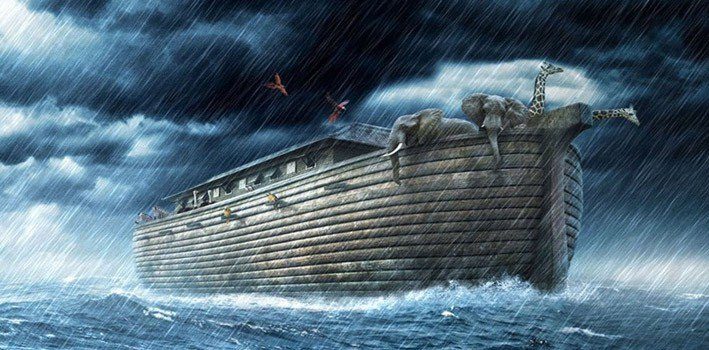 In the Bible, we see God choosing, calling and guiding certain men to function as patriarchs. Sometimes we can speak of pre-flood patriarchs such as Adam, Noah and Seth. When it comes to the patriarchs after the flood, we draw another set of lines, beginning with Noah's son Shem to eventually what would be three "post-flood" patriarchs: Abraham, Isaac and Jacob. Noah would come to represent the most important of the "pre-flodd" patriarchs. If we draw a line from Noah to Abraham, we have exactly ten generations, representing an unbroken line of people who carried the message of God's salvation (shedding of innocent blood on the behalf of the guilty, reception of salvation by faith).
The most important of the post-flood patriarchs: Abraham
In the Bible, we see God choosing, calling and guiding certain men to function as patriarchs. Sometimes we can speak of pre-flood patriarchs such as Adam, Noah and Seth. When it comes to the patriarchs after the flood, we draw another set of lines, beginning with Noah's son Shem to eventually what would be three "post-flood" patriarchs: Abraham, Isaac and Jacob. Noah would come to represent the most important of the "pre-flodd" patriarchs. If we draw a line from Noah to Abraham, we have exactly ten generations, representing an unbroken line of people who carried the message of God's salvation (shedding of innocent blood on the behalf of the guilty, reception of salvation by faith).
The most important of the post-flood patriarchs: Abraham
 We first meet Abraham at the end of Genesis 11. Abraham was a normal guy who lived in a pagan city. It is in Genesis 12 that we see God choosing and calling of Abraham to move from the city of his birth to a far-away country (Genesis 12:1-7). God's plan of salvation, as we already saw, had involved a covenant of grace which He made originally with Eve back in Genesis 3:15.
We first meet Abraham at the end of Genesis 11. Abraham was a normal guy who lived in a pagan city. It is in Genesis 12 that we see God choosing and calling of Abraham to move from the city of his birth to a far-away country (Genesis 12:1-7). God's plan of salvation, as we already saw, had involved a covenant of grace which He made originally with Eve back in Genesis 3:15.
The pattern of salvation would involve God bringing about the Savior of mankind through a specific part of humanity. God had narrowed down the specifics of His plan from humanity in general (Adam and Eve) to a portion of humanity (Noah and Shem) to then a person (Abraham). Abraham was promised that God would make him a blessing to all the nations. God chose Abraham and Sarah to be the beginnings of his chosen people, the Hebrews, whom He would make into the nation of Israel. Although they both were beyond child-bearing age, and Sarah herself was incapable of having children, God nevertheless demonstrated that nothing is impossible for Him (Genesis 18).
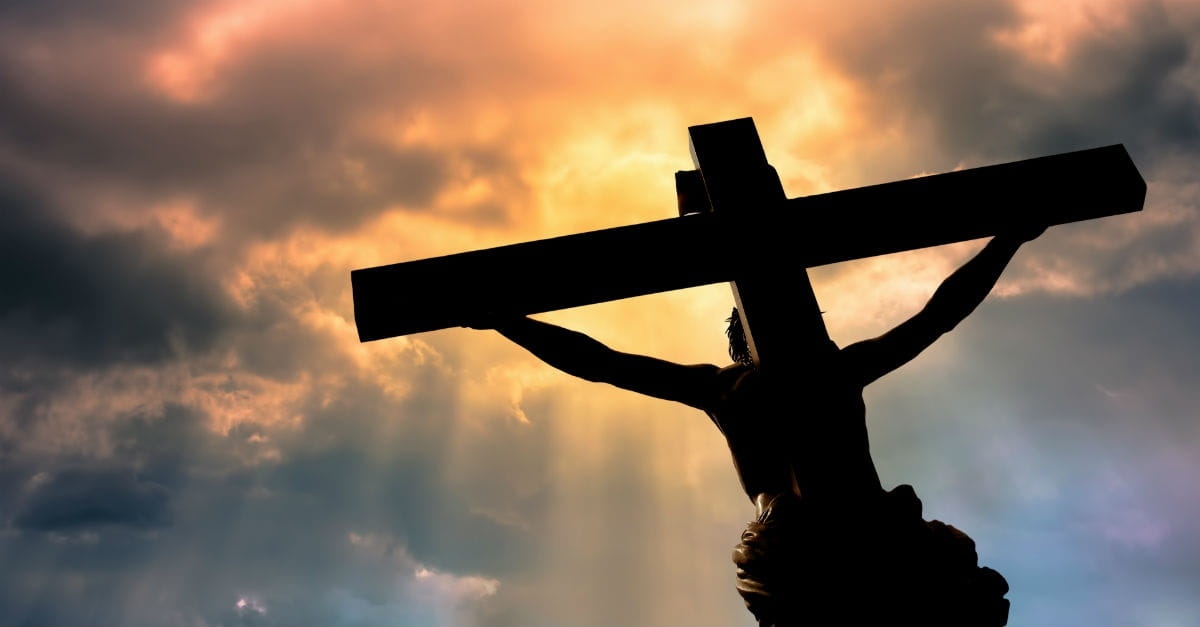 The covenant God made with Abraham contained three elements: a land, a blessing and a descendant. The land part would become the nation of Israel. The blessing God promised to Abraham would turn into the Gospel of salvation being offered to all the nations (see Galatians 3-4). The promise of descendants would first result in the coming forth of the Jewish people and then ultimately Jesus (see Galatians 3).
The covenant God made with Abraham contained three elements: a land, a blessing and a descendant. The land part would become the nation of Israel. The blessing God promised to Abraham would turn into the Gospel of salvation being offered to all the nations (see Galatians 3-4). The promise of descendants would first result in the coming forth of the Jewish people and then ultimately Jesus (see Galatians 3).
 God's covenant with Abraham also included a symbol which would distinguish Abraham and his future descendants from every other people group - circumcision (circumcision is a form of minor surgery performed upon every male child shortly after birth). All covenants in the Bible have some sort of "symbol" or "sign", an oath of promise and blessings or curses (see Hebrews 6:9-18). Since God's covenant with Abraham was an expression of God's covenant of grace, that meant Abraham and any of his future descendants would need to embrace God's promises by faith. Abraham would trust God by faith (Genesis 15:6), therefore giving us a reminder of how we receive salvation: by grace through faith apart from doing good things (please see Ephesians 2:8-9; Titus 3:4-5).
Meet the rest of the Patriarchs: Isaac and Jacob
God's covenant with Abraham also included a symbol which would distinguish Abraham and his future descendants from every other people group - circumcision (circumcision is a form of minor surgery performed upon every male child shortly after birth). All covenants in the Bible have some sort of "symbol" or "sign", an oath of promise and blessings or curses (see Hebrews 6:9-18). Since God's covenant with Abraham was an expression of God's covenant of grace, that meant Abraham and any of his future descendants would need to embrace God's promises by faith. Abraham would trust God by faith (Genesis 15:6), therefore giving us a reminder of how we receive salvation: by grace through faith apart from doing good things (please see Ephesians 2:8-9; Titus 3:4-5).
Meet the rest of the Patriarchs: Isaac and Jacob
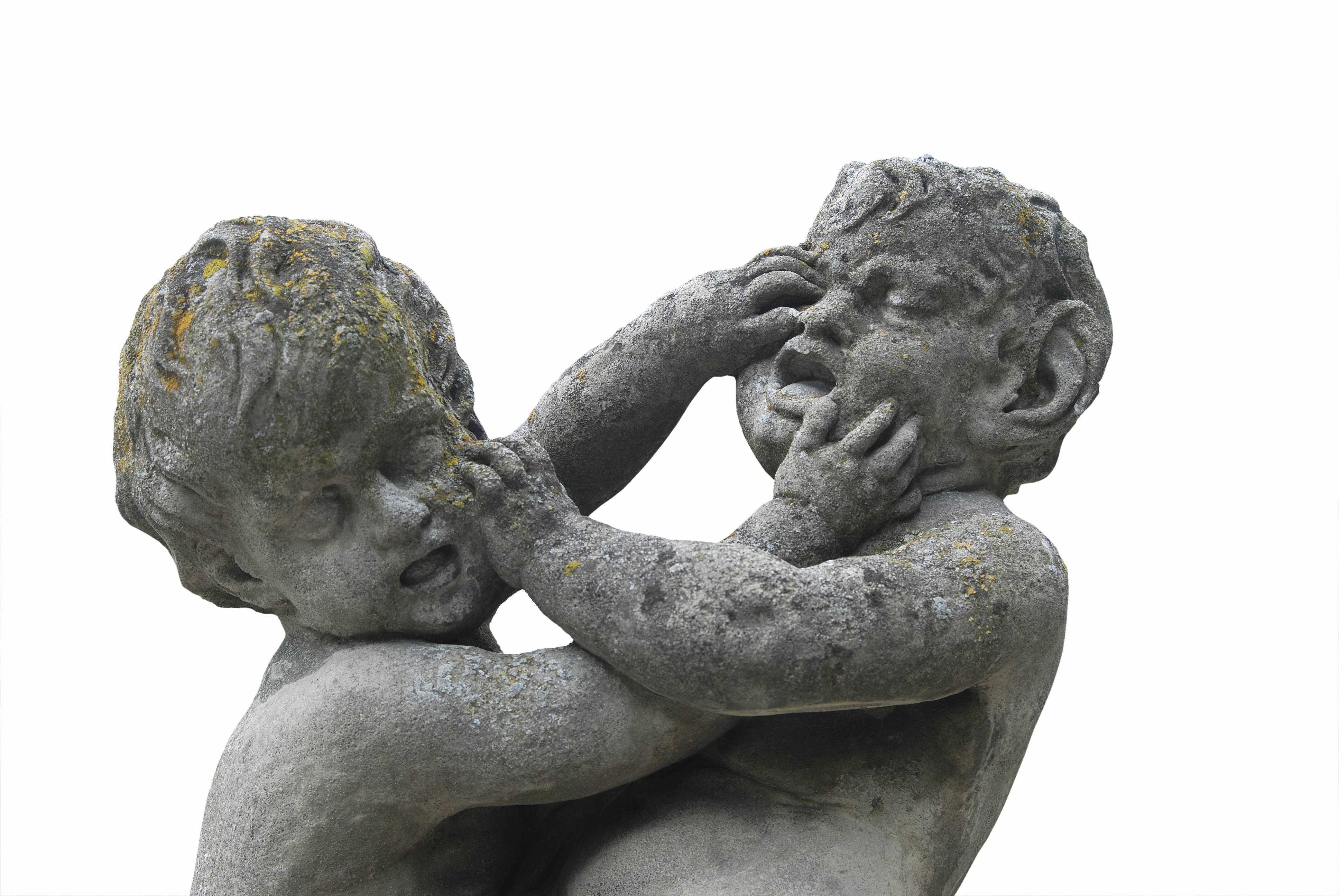 As we move forward, one of Abraham's sons, Isaac, would become the heir of all the promises God made to Abraham and thus be our next patriarch. Isaac’s story is not as long and detailed as Abraham’s, however, Isaac and his wife Rebekkah would have twin sons: Esau and Jacob. God already had decided to choose Jacob, rather than Esau, as the next patriarch who would carry on the promised covenant of Abraham. Although God chose Jacob, he still needed to respond to God’s call by faith (see Genesis 28).
As we move forward, one of Abraham's sons, Isaac, would become the heir of all the promises God made to Abraham and thus be our next patriarch. Isaac’s story is not as long and detailed as Abraham’s, however, Isaac and his wife Rebekkah would have twin sons: Esau and Jacob. God already had decided to choose Jacob, rather than Esau, as the next patriarch who would carry on the promised covenant of Abraham. Although God chose Jacob, he still needed to respond to God’s call by faith (see Genesis 28).
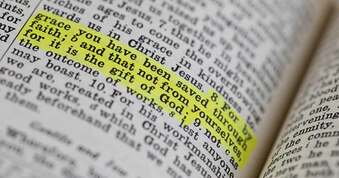 Jacob and Esau both illustrate the twin truths we find throughout the Bible: God's gracious work in drawing sinners and man's responsibility to receive the gracious work. Both Esau and Jacob had equal exposure to God’s promises, yet, Esau's missing out on the promise of God is due to Esau's willful choice to reject God's covenant promises offered to Him in the covenant made with his father (Isaac) and grandfather (Abraham). Consequently, Esau would end up rejecting his right to inherit as the oldest son, symbolizing that in his heart, Esau had also rejected God’s well-meant offer of salvation (Hebrews 12:16).
Jacob and Esau both illustrate the twin truths we find throughout the Bible: God's gracious work in drawing sinners and man's responsibility to receive the gracious work. Both Esau and Jacob had equal exposure to God’s promises, yet, Esau's missing out on the promise of God is due to Esau's willful choice to reject God's covenant promises offered to Him in the covenant made with his father (Isaac) and grandfather (Abraham). Consequently, Esau would end up rejecting his right to inherit as the oldest son, symbolizing that in his heart, Esau had also rejected God’s well-meant offer of salvation (Hebrews 12:16).
 Jacob, on the other hand, responded positively to God's gracious salvation through that same set of covenant promises we witnessed with Abraham and Isaac. Why? Scripture uniformly credits God's grace as the reason (see Malachi 1:2; Romans 9:6-18). God would orchestrate a dramatic encounter with Jacob in Genesis 32, followed by a change in his name to that of: “Israel”. Jacob (also called, “Israel”) would end up as father of twelve sons, each becoming patriarchs or founders of the twelve groups or tribes of Israel. Jacob and Esau are used extensively through the Old and New Testament to illustrate how God works in salvation per His gracious plan and the need for individuals to respond in faith to that gracious plan.
Applications we can glean from consideration of the patriarchs
Jacob, on the other hand, responded positively to God's gracious salvation through that same set of covenant promises we witnessed with Abraham and Isaac. Why? Scripture uniformly credits God's grace as the reason (see Malachi 1:2; Romans 9:6-18). God would orchestrate a dramatic encounter with Jacob in Genesis 32, followed by a change in his name to that of: “Israel”. Jacob (also called, “Israel”) would end up as father of twelve sons, each becoming patriarchs or founders of the twelve groups or tribes of Israel. Jacob and Esau are used extensively through the Old and New Testament to illustrate how God works in salvation per His gracious plan and the need for individuals to respond in faith to that gracious plan.
Applications we can glean from consideration of the patriarchs
As God continued to work with mankind, He did so not only through conscience and government, but also through the patriarchs (Abraham, Isaac and Jacob). God's gracious choice of Noah over other men of his era, Abraham over his siblings, Isaac over his brother Ishmael and Jacob over Esau reminds us of the truth repeated throughout the Old and New Testaments: "salvation is of the Lord" (Psalm 3:8; Isaiah 45:17; Jonah 2:9-10; Romans 10:6-15; Ephesians 2:8-9). We see equally presented the need for individuals to respond to the Spirit's call to believe, repent and be saved from their sins and the wrath of God to come (Acts 2:36-37; 17:31; Romans 5:6-9; 1 Thessalonians 1:9-10). Such truths about human salvation found in Genesis 12-50 are still the basis for how God the Holy Spirit works forth in calling forth individuals to Himself to believe on the Lord Jesus Christ for their salvation (John 16:8-12; Romans 10:9-15). The next theme we will consider in our ongoing study is that vital theme of "redemption".
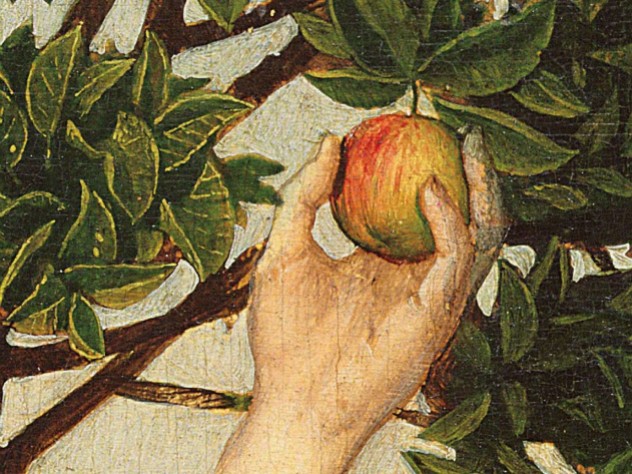 Introduction:
Introduction:
In our last post we started an overview of the Bible that focuses on major themes called: "A bird's-eye view of the Bible". Interested readers can review the last post by clicking on the link here: http://www.growingchristianresources.com/2020/01/birds-eye-view-of-bible-theme-of.html
We encountered our first theme of "Creation", noting how God created everything, life and humanity. Today's post will continue on our exploration and overview of the Bible through major themes. We will investigate the Fall of Adam and Eve in Genesis 3 and the subsequent ripple effects that would impact all of creation and humanity. The theme for today's post is what we will called: "catastrophe".
What is meant by the term "catastrophe"?
 When we think of the consequences of the catastrophe of the fall, we first of all need to ask ourselves: "what is meant by 'catastrophe'. In simple terms, a catastrophe is a great-big disaster. Imagine baking the most beautiful cake in the world, complete with chocolate frosting and piped red roses. The cake has three-layers and is ready for eating. Suddenly, a large St. Bernard bounds out of nowhere, jumps upon the table and runs right through the cake! The dog then devours the cake, leaving crumbs and frosting everywhere all over the kitchen. One word can summarize the scene: catastrophe!
When we think of the consequences of the catastrophe of the fall, we first of all need to ask ourselves: "what is meant by 'catastrophe'. In simple terms, a catastrophe is a great-big disaster. Imagine baking the most beautiful cake in the world, complete with chocolate frosting and piped red roses. The cake has three-layers and is ready for eating. Suddenly, a large St. Bernard bounds out of nowhere, jumps upon the table and runs right through the cake! The dog then devours the cake, leaving crumbs and frosting everywhere all over the kitchen. One word can summarize the scene: catastrophe!
:max_bytes(150000):strip_icc()/Adam-and-Eve-GettyImages-171163783-584988e13df78ca8d5572385.jpg) This horrific scene is a beautiful day in the park compared to the catastrophe of Adam and his wife’s rebellion in Genesis 3. In our last theme, we saw God creating and making everything. Furthermore, we discovered God is a relational God, and that He relates to our world by way of “covenants” or “binding agreements”. Sadly, Adam and his wife would make a fatal choice that would break the covenant of works God had made with them and thus, putting an end to the “age of innocence”.
This horrific scene is a beautiful day in the park compared to the catastrophe of Adam and his wife’s rebellion in Genesis 3. In our last theme, we saw God creating and making everything. Furthermore, we discovered God is a relational God, and that He relates to our world by way of “covenants” or “binding agreements”. Sadly, Adam and his wife would make a fatal choice that would break the covenant of works God had made with them and thus, putting an end to the “age of innocence”.
 In what follows under this second major theme, three main catastrophes or tragedies are recorded in Genesis 3-11: The Fall of Adam and Eve, the flood of Noah and the Tower of Babel. We will spend most of our time on the first of these, since all that unfolds throughout the rest of the Bible is related to the first catastrophe - "The Fall".
In what follows under this second major theme, three main catastrophes or tragedies are recorded in Genesis 3-11: The Fall of Adam and Eve, the flood of Noah and the Tower of Babel. We will spend most of our time on the first of these, since all that unfolds throughout the rest of the Bible is related to the first catastrophe - "The Fall".
Catastrophe #1: The Fall
There are 1,189 chapters in our Bibles. Whenever we glance at the 1,189 chapters of the Biblical text, only four of those chapters record no sinfulness of any creature - Genesis 1-2 and Revelation 21-22. When God created everything, He did so without any imperfections. Genesis 1-2 presents a creation with no sin, heartache or death. Revelation 21-22 describes what will be a New Heavens and New Earth that are dominated by a God-centered, sinless reality (see also 1 Peter 3:13). So, what happened in the other 1,185 chapters of the Bible? What follows in the remainder of the Bible are the consequences of three major catastrophes: The Fall (Genesis 3-5), The Flood (Genesis 6-9) and the Tower of Babel (Genesis 10-11).
 The first and greatest of these catastrophes is described by two jarring words, "The Fall". God had a special plan for mankind, namely, to implant within him His image and to have a covenant relationship with him. Human beings were not just physical creations, but also moral and spiritual beings.
The first and greatest of these catastrophes is described by two jarring words, "The Fall". God had a special plan for mankind, namely, to implant within him His image and to have a covenant relationship with him. Human beings were not just physical creations, but also moral and spiritual beings.
Adam was to teach his wife everything God told him in the covenant of works - which fruits they could eat, which to avoid and their role in exercising God-given authority. God gave the newly married couple everything they needed to fulfill the covenant he gave them (Genesis 2). If they met God's conditions, they would enjoy an eternity with him, ruling the earth and populating the world with other people just like them. However, a great test was to come upon the man and the woman. The great enemy of man and God, Satan, entered the Garden. He tricked the woman (soon-to-be-named "Eve) into talking with him and eating of the forbidden fruit. Adam was there whenever Eve and the Serpent had their conversation. Adam's tolerance of the serpent meant he had broken that original covenant - for he and his wife were to take dominion over all life.
 The outcome of Adam and Eve's decision to disobey God resulted in sin, leading to a curse and death on creation and the entire human race (see Genesis 3:7-19; Romans 5:12-21). Adam and Eve hid from God as God came down, walking in the garden He had planted, and which they were to care for (Genesis 3:5-8). The great catastrophe was underway in our world. Adam and his wife had broken God's original covenant of commands or "works". To review, God had told them that in the day they ate of the fruit of the tree of knowledge of good and evil, they would surely die. Adam and Eve died spiritually. They physically should had died too, since God was obligated to give them justice. However, God did something unexpected.
The outcome of Adam and Eve's decision to disobey God resulted in sin, leading to a curse and death on creation and the entire human race (see Genesis 3:7-19; Romans 5:12-21). Adam and Eve hid from God as God came down, walking in the garden He had planted, and which they were to care for (Genesis 3:5-8). The great catastrophe was underway in our world. Adam and his wife had broken God's original covenant of commands or "works". To review, God had told them that in the day they ate of the fruit of the tree of knowledge of good and evil, they would surely die. Adam and Eve died spiritually. They physically should had died too, since God was obligated to give them justice. However, God did something unexpected.
 The Fall of Adam and his wife ultimately impacted all of us. The only thing God owed humanity was justice and judgment. However, God is a relational God and had already planned to extend a second covenant, called by Bible teachers: “the covenant of grace” (see Genesis 3:15, 20-21; Hosea 6:7). In this covenant of grace, God spoke about a future war between the serpent (Satan) and a descendant that would somehow come from Eve. What makes Genesis 3:15 so important is that it predicted what would be Jesus’ coming to earth to die on the cross for our sins.
The Fall of Adam and his wife ultimately impacted all of us. The only thing God owed humanity was justice and judgment. However, God is a relational God and had already planned to extend a second covenant, called by Bible teachers: “the covenant of grace” (see Genesis 3:15, 20-21; Hosea 6:7). In this covenant of grace, God spoke about a future war between the serpent (Satan) and a descendant that would somehow come from Eve. What makes Genesis 3:15 so important is that it predicted what would be Jesus’ coming to earth to die on the cross for our sins.
 When Adam heard this covenant spoken by God, he called his wife, "Eve", which means: "the mother of the living one". This response of Adam and Eve indicated that they received God's word by faith. God then killed two animals in their place, setting the pattern for salvation to come (Genesis 3:20-21). The ingredients of the Gospel were all present: God's grace, man's faith and the shedding of innocent blood were all present in God’s covenant of grace.
Catastrophe #2 – The Flood
When Adam heard this covenant spoken by God, he called his wife, "Eve", which means: "the mother of the living one". This response of Adam and Eve indicated that they received God's word by faith. God then killed two animals in their place, setting the pattern for salvation to come (Genesis 3:20-21). The ingredients of the Gospel were all present: God's grace, man's faith and the shedding of innocent blood were all present in God’s covenant of grace.
Catastrophe #2 – The Flood
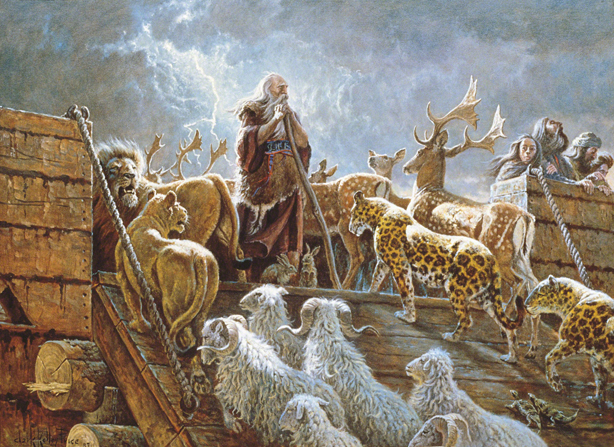 It is from Genesis 3 to Genesis 11 that we find the catastrophe of The Fall spread to all humanity. The Fall was and still is the first great catastrophe. There are two other catastrophes we will mention before closing out this theme. In Genesis 6-9, we see Noah and his family in the second great catastrophe: the world-wide flood.
It is from Genesis 3 to Genesis 11 that we find the catastrophe of The Fall spread to all humanity. The Fall was and still is the first great catastrophe. There are two other catastrophes we will mention before closing out this theme. In Genesis 6-9, we see Noah and his family in the second great catastrophe: the world-wide flood.
 The wickedness of mankind had grown so badly that God decreed a flood of waters that would last for over a year. Sometimes Bible teachers describe God’s relationship with Noah as the beginnings of a new period in Biblical history, whereby God’s dealings with human beings was that of government. Mankind had failed in this arrangement God had made, much like Adam and Eve had broken God’s original covenant of works.
The wickedness of mankind had grown so badly that God decreed a flood of waters that would last for over a year. Sometimes Bible teachers describe God’s relationship with Noah as the beginnings of a new period in Biblical history, whereby God’s dealings with human beings was that of government. Mankind had failed in this arrangement God had made, much like Adam and Eve had broken God’s original covenant of works.
 Thankfully, God never gives up and promises to never destroy the world with a flood of water with the accompanying sign of a rainbow. This promise God made to Noah and all humanity has similarities to God’s original covenant of grace with Adam and Eve: God’s grace, blood sacrifice and reception by faith (see Genesis 8:20-22). God gave a sign for His covenant with Noah - a rainbow. Whenever we see rainbows, we are reminded that God is ever true to His promises.
Thankfully, God never gives up and promises to never destroy the world with a flood of water with the accompanying sign of a rainbow. This promise God made to Noah and all humanity has similarities to God’s original covenant of grace with Adam and Eve: God’s grace, blood sacrifice and reception by faith (see Genesis 8:20-22). God gave a sign for His covenant with Noah - a rainbow. Whenever we see rainbows, we are reminded that God is ever true to His promises.
Catastrophe #3 – The Tower of Babel
 Noah’s three sons – Shem, Ham and Japheth – would become the sources for the original seventy nations of the ancient world (see Genesis 10). As we already noted, God gave humanity the ability to govern according to His law which everyone knew about in their hearts (see Romans 2:14-15). Although the world-wide flood had wiped all but Noah and his family, the problem of sin was never taken-away.
Noah’s three sons – Shem, Ham and Japheth – would become the sources for the original seventy nations of the ancient world (see Genesis 10). As we already noted, God gave humanity the ability to govern according to His law which everyone knew about in their hearts (see Romans 2:14-15). Although the world-wide flood had wiped all but Noah and his family, the problem of sin was never taken-away.
Mankind had become numerous once again and was ready to severe any connections to the Creator in favor of worship false gods and goddesses. This would lead to the third great catastrophe - the Tower of Babel in Genesis 11. Whenever God saw that humanity was going to harm itself, He decreed that everyone speak different languages. This act of God resulted in humanity spreading across our globe. Although the world seemed darker than ever, God’s plans would go from dealing with the nations to one individual – Abraham. We will meet Abraham and his family in our next post as we continue our "bird's-eye survey" of the Bible.

























:max_bytes(150000):strip_icc()/Moses-and-the-Ten-Commandments-GettyImages-171418029-5858376a3df78ce2c3b8f56d.jpg)














:max_bytes(150000):strip_icc()/Adam-and-Eve-GettyImages-171163783-584988e13df78ca8d5572385.jpg)








